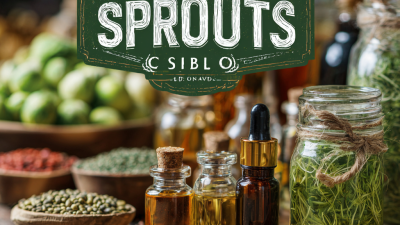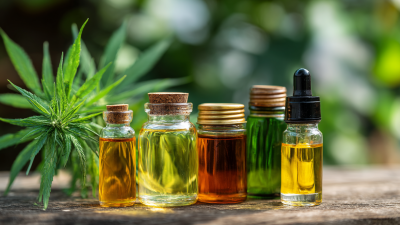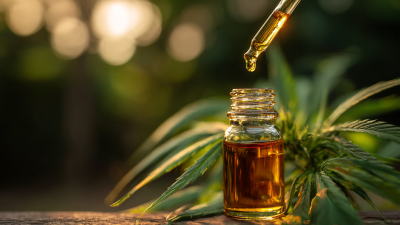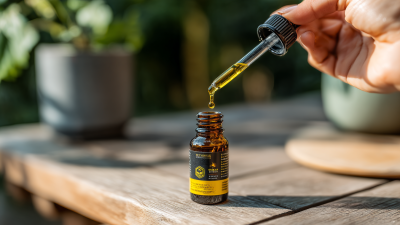In recent years, the popularity of Non THC CBD Oil has surged as consumers seek alternative wellness solutions without the psychoactive effects associated with traditional cannabis products. This versatile oil has captured the attention of global buyers, offering a range of potential benefits, from alleviating anxiety to promoting relaxation and even aiding in pain relief.

However, despite its growing acceptance, the market is not without its problems. Issues such as quality control, transparency, and understanding the various extraction methods have left many consumers confused and wary. As we delve into the complexities surrounding Non THC CBD Oil, it becomes essential to navigate these challenges to ensure a safe and beneficial experience for all users.
This exploration will not only highlight the advantages of Non THC CBD Oil but also address the pressing concerns that must be tackled to fully harness its potential in the global market.
Non-THC CBD oil has emerged as a versatile and popular alternative for global buyers seeking the benefits of cannabis without the psychoactive effects of THC. This unique oil is derived from hemp plants, containing high levels of cannabidiol (CBD) while remaining compliant with legal limits on THC content. The key characteristics of non-THC CBD oil include its non-intoxicating nature, rich cannabinoid profile, and potential therapeutic benefits such as reducing anxiety, alleviating pain, and improving sleep quality.
When considering non-THC CBD oil, it's essential to explore different extraction methods and formulations available on the market. Full-spectrum oils retain a variety of cannabinoids and terpenes, which can enhance the therapeutic effect through the entourage effect. Alternatively, broad-spectrum CBD oil offers similar benefits without any THC, appealing to users who prefer to avoid this compound entirely.
**Tips:** Always check for third-party lab testing results to ensure the product's purity and potency. Start with a low dosage to gauge your body’s response, gradually increasing until you find the ideal amount that meets your needs. Additionally, consult with a healthcare professional before incorporating CBD oil into your wellness routine, especially if you are taking other medications.
| Characteristic | Description | Potential Benefits |
|---|---|---|
| Source | Hemp plants | Rich in CBD, low in THC |
| THC Content | Less than 0.3% | Legal in many regions |
| Usage Forms | Oils, tinctures, capsules, topicals | Versatile applications |
| Research | Ongoing studies | Current and potential therapeutic benefits |
| Common Benefits | Anxiety relief, pain management | Improved quality of life |
| Regulatory Status | Varies by country | Important for buyers |
When searching for high-quality non-THC CBD oil, buyers should focus on several essential features to ensure they find effective and reliable products. According to a report by Brightfield Group, the CBD market is projected to reach $20 billion by 2024, underlining the importance of distinguishing reputable products amid growing options. The first critical feature to look for is the source of the hemp. Organic, domestically-grown hemp is often associated with higher quality and lower levels of contaminants, making it a preferable choice.
Another essential aspect is the extraction method used to obtain CBD oil. CO2 extraction is considered the gold standard, as it retains the beneficial compounds while avoiding harmful solvents. A 2021 study by the Journal of Cannabis Research indicated that products utilizing this extraction method have a higher cannabinoid profile and greater efficacy. Finally, potential buyers should always check for third-party testing results, which provide transparency regarding the product's purity and potency. With over 60% of CBD consumers concerned about product quality, these features play a crucial role in making informed decisions in a rapidly evolving market.

As the global market for CBD products continues to expand, buyers are seeking alternatives that align with their health and wellness needs. Non-THC CBD oil has emerged as a versatile option, particularly because it provides the therapeutic benefits of cannabinoids without the psychoactive effects associated with THC. According to a report by Brightfield Group, the non-THC CBD market is projected to reach $22 billion by 2024, reflecting a growing consumer preference for products that are both effective and legally compliant across various regions.

When comparing non-THC CBD oil to other alternatives such as traditional medications or even other natural supplements, it stands out due to its unique profile of health benefits. A study published in the Journal of Pain Research highlights that non-THC CBD oil can help alleviate symptoms associated with anxiety, chronic pain, and inflammation. Moreover, as more consumers prioritize transparency in sourcing, non-THC CBD products often come with third-party lab testing certifying their purity and potency, making them a trustworthy choice in an industry still grappling with regulation and quality control issues.
The global market for non-THC CBD oil is expanding rapidly, attracting buyers from various regions. However, navigating the regulatory landscape can be challenging, particularly as different countries implement unique frameworks for cannabis-related products. In Europe, for example, there is significant variation in how medical cannabis, including CBD oil, is regulated. Potential buyers must be aware of not only local laws but also EU regulations that may impact their purchases.
Italy serves as a case study in this evolving regulatory environment. The country has been making strides to establish a more accessible framework for cannabis-based treatments, appealing to both domestic consumers and international buyers. As the market progresses, it is crucial for those looking to purchase non-THC CBD oil to familiarize themselves with a checklist of requirements, including product labeling, THC content limits, and import/export restrictions. This diligence ensures compliance and facilitates a more informed buying experience, ultimately contributing to safer consumer practices and a thriving global market.
This chart illustrates the growing interest in Non-THC CBD oil across various regions from 2020 to 2023, highlighting the versatility and expanding market for global buyers amidst regulatory challenges.
Non-THC CBD oil has emerged as a versatile alternative for individuals seeking the therapeutic benefits of cannabis without the psychoactive effects. This makes it particularly appealing for a diverse audience, including those looking to manage anxiety,
stress, and chronic pain. To maximize your experience with non-THC CBD oil, it is crucial to find the right dosage that works for your individual needs.
Start with a lower dose and gradually increase it, paying attention to how your body reacts. This personalized approach ensures you enjoy the desired effects while minimizing potential side effects.
Incorporating non-THC CBD oil into your daily routine can be simple and effective. Consider adding it to your morning smoothie or evening tea to harness its calming properties throughout the day. Additionally, using it consistently can lead to improved outcomes, especially for those dealing with anxiety and sleep disturbances. Remember to explore different product forms, such as tinctures or capsules, to discover which method aligns best with your lifestyle. With thoughtful use, non-THC CBD oil can become a beneficial staple for enhancing your overall well-being.







